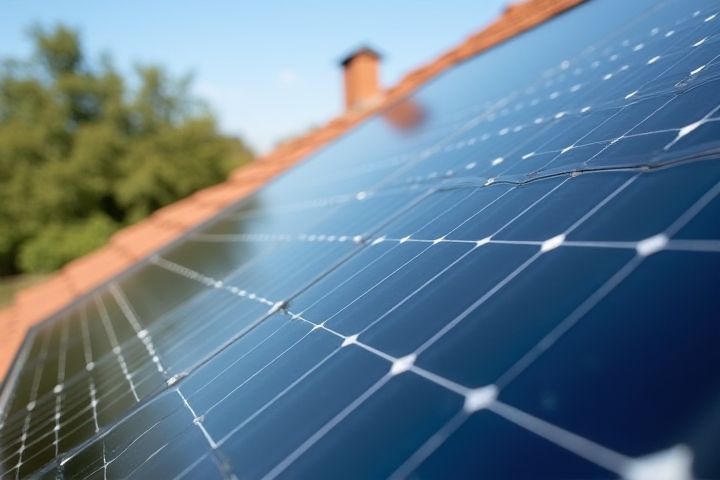
Installing a house solar system significantly reduces electricity bills by harnessing renewable energy from the sun. This clean energy source lowers your carbon footprint, contributing to a more sustainable environment. By investing in solar panels, you increase your home's value and attractiveness in the real estate market. Many regions offer tax incentives and rebates to reduce the overall cost of installation, enhancing the return on your investment. A solar system promotes energy independence, allowing you to generate your own power and protect yourself from rising utility rates.
Why Install A House Solar System
Reduces electricity bills
Installing a house solar system significantly reduces your electricity bills by harnessing renewable energy from the sun. Solar panels convert sunlight into electricity, allowing you to generate your own power and decrease reliance on the grid, leading to substantial savings over time. By producing clean energy, you can offset the costs of electricity consumption, especially during peak usage times when rates are higher. Moreover, many regions offer financial incentives and tax credits for solar installations, enhancing your long-term savings and making it an economically viable investment for your home.
Environmentally friendly
Installing a house solar system significantly reduces your carbon footprint by harnessing renewable energy from the sun, thus decreasing reliance on fossil fuels. Solar panels convert sunlight into electricity, which can power your home while emitting zero greenhouse gases. By choosing solar energy, you contribute to the reduction of air pollution and help mitigate climate change, promoting a healthier planet. Embracing solar technology not only benefits your household but also supports a sustainable future for generations to come.
Increases property value
Installing a solar system can increase your property value by approximately 4% to 6%. Homes equipped with solar panels often attract more buyers, as they provide long-term energy savings and sustainability. The average homeowner could save around $1,500 annually on electricity costs, making the property more appealing. Moreover, many states offer incentives such as tax credits or rebates, further enhancing the financial attractiveness of solar-installation investments.
Independence from grid
Installing a house solar system can significantly enhance your energy independence by reducing reliance on the electric grid. With an average solar panel installation costing between $15,000 and $25,000, homeowners can generate their own electricity, resulting in lower monthly utility bills and potential savings of up to 80% over time. By harnessing sunlight, typically offering around 5-6 hours of peak production daily, you can power your home without dependence on fluctuating energy prices or grid outages. Transitioning to solar not only provides financial benefits but also promotes sustainability, as you contribute to reducing carbon emissions by using renewable energy sources.
Renewable energy source
Installing a solar system for your home harnesses a renewable energy source that significantly reduces your carbon footprint, allowing you to contribute to environmental sustainability. By utilizing solar panels, you can convert sunlight into electricity, which can lower your utility bills by up to 70%, depending on your location and energy consumption. Federal and state incentives, which can include tax credits up to 26% and rebates, make solar installations more affordable, offering a potential return on investment within five to seven years. With a typical solar panel lifespan of 25 years, this investment not only supports renewable energy but also adds value to your property.
Low maintenance costs
Installing a house solar system can significantly reduce maintenance costs over time. Most solar panels come with a 25 to 30-year warranty, ensuring longevity and reliability, which translates to minimal upkeep expenses. The average annual maintenance cost for solar systems is around $100, primarily for occasional cleaning and inspections, compared to potentially thousands spent on conventional energy sources each year. By harnessing solar energy, you can enjoy lower bills and maintenance efforts while contributing to a more sustainable environment.
Government incentives
Installing a house solar system can significantly reduce your electricity bills while contributing to environmental sustainability. Government incentives, such as tax credits and rebates, can substantially lower the initial installation costs, making solar energy more accessible. Many regions also offer performance-based incentives that reward homeowners for the energy produced by their solar systems, further enhancing savings. By taking advantage of these financial benefits, you can invest in renewable energy that not only saves you money but also increases your property value.
Long-term investment
Installing a house solar system is a strategic long-term investment that significantly reduces your energy bills over time. By harnessing renewable solar energy, you can decrease your reliance on traditional power sources, leading to substantial savings and increased property value. Furthermore, the initial installation cost of solar panels can be offset by various tax incentives and rebates, making the investment more financially attractive. As energy prices continue to rise, locking in your solar energy production ensures stability and predictability in your utility expenses for years to come.
Technological advancements
Installing a house solar system offers the significant benefit of harnessing cutting-edge photovoltaic technology, converting sunlight into electricity with efficiencies exceeding 22%. Modern solar panels are designed to withstand harsh environmental conditions, featuring durable materials that last over 25 years, ensuring a long-term energy solution. Smart inverters now come equipped with monitoring systems, allowing you to track energy production and consumption in real-time via smartphone applications. As solar energy systems become more integrated with battery storage solutions, homeowners can achieve greater energy independence and potentially save thousands on utility bills in the long run.
Reduces carbon footprint
Installing a house solar system significantly reduces your carbon footprint by harnessing renewable energy from the sun. Transitioning to solar power can cut greenhouse gas emissions by approximately 80% over a typical solar panel lifespan of 25 years, effectively mitigating climate change. Every kilowatt-hour (kWh) of solar energy generated eliminates about 0.85 pounds of carbon dioxide emissions, contributing to cleaner air and a healthier environment. By adopting solar energy, you actively participate in global efforts to reduce reliance on fossil fuels and promote sustainable living.
